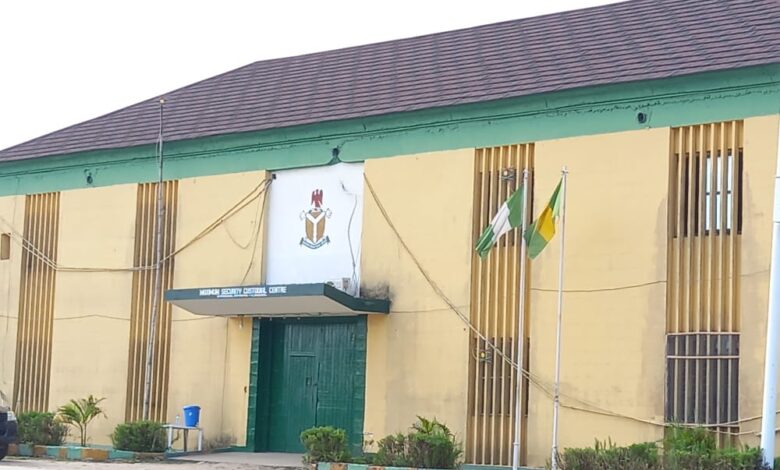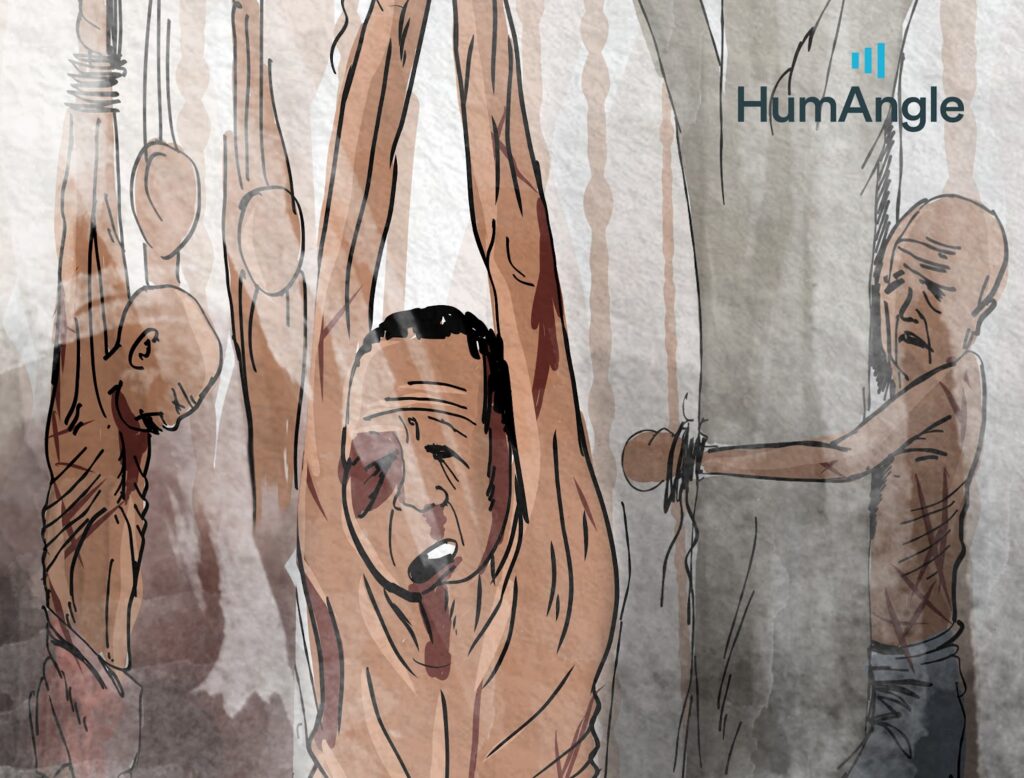This All-Female Legal Team Is Helping Decongest Nigeria’s Correctional Centres
Seeing how Nigerians rot in unlawful detention, a non-governmental organisation is out to change the narrative.

Solomon Samuel is a young Nigerian struggling for survival as an electrician in Lagos, Southwest Nigeria. He was wrongfully arrested during an unprofessional raid by police personnel attached to the disbanded Special Anti-Robbery Squad (SARS) in the state’s capital, Ikeja, in June 2020.
In their usual manner, the police took him to Ikeja Police Division and subsequently arraigned him before a Magistrate Court with the offence of “belonging to an unlawful society and being a disorderly person.”
Though granted bail, he remained in detention for months because he didn’t have the resources to meet his bail conditions. He was, however, lucky enough to meet one of Headfort Foundation’s lawyers, Eniola Omosehin, on Feb. 20, 2021, who took over the case.
HumAngle learnt that the case suffered several adjournments due to COVID-19 outbreak and failure of the prosecutors to bring the defendant to court. While efforts were ongoing to get him out of the unlawful detention, Samuel was driven to another High Court to appear as the defendant in an unrelated case of sexual assault.
The court was said to have issued a warrant to the correctional centre for a person bearing a similar name to be produced in court as Samuel was mistaken for the defendant in the case involving sexual assault.
While the Magistrate Court struck out his first case on Dec. 20, 2021, due to lack of diligence from the end of the police, he remained in detention because of the High Court matter. Samuel did not regain his freedom until Feb. 4, 2022, when Headfort Foundation’s lawyer informed the court about the case of mistaken identity.
The prosecution counsel corroborated this and after cross-checking court records, it was discovered that Samuel was not the accused person in the case before the High Court, hence he was released immediately.
The initiative
Headfort Foundation is a non-profit organisation established on March 9, 2019 with the aim of decongesting Nigerian prisons. The initiative, according to the information on its website, is managed by 100 per cent female lawyers through different projects such as “Lawyers without border,” “Lawyers Nownow App,” “Bail the indigent,” and “Ex-inmates support initiative.”
HumAngle learnt that all of the projects are necessary to ensure that every Nigerian, regardless of their economic status, get access to justice, to ensure that hope is given to indigent inmates through free legal representation and advocate for better criminal justice system reform.
The effort has since inception provided pro bono service in over 1000 cases and has helped to secure the release of over 200 illegal detainees.
Speaking on its legal operations on its website, the foundation’s founder, Oluyemi Orija, said “indigent inmates do not have legal representation because they cannot afford one, hence they are at the mercy of the prosecution. Our volunteers who have been intensely trained take up cases assigned to them passionately to ensure that the remand rate in Nigeria is brought down to its barest minimum.”
Their projects
Headfort Foundation developed the Lawyers NowNow App as a means of digitalising the Lawyers Without Border project. This app allows every indigent person, without any form of discrimination, to access justice anywhere in Nigeria freely with the provision of emergency services, legal advice, and professional services.
“Once a user applies for a lawyer by filling a short form from any of the available services, the app automatically connects users to the lawyer nearest to that location. The lawyer can be contacted through a phone call, SMS or WhatsApp message.
“The lawyer will receive notification of the application and will attend to the user free of charge. After the completion of the case, the user has an option of sending in a review and rating the performance of the lawyer and the lawyer can also give his report,” the details on the website read.
The organisation also runs the “Bail the Indigent” project which focuses on meeting the bail conditions of inmates in Nigerian prisons by soliciting for funds both online and offline for 20 inmates per month with the average sum for the bail of one inmate at N60,000.
There’s also a “sensitisation project” targeting “taxi/bus drivers, mechanics, tailors, stylists, domestic staff, menial workers in general, and senior secondary school students. These set of people go to their various places of work every day and fall victim to police brutality because they lack information on their rights and what is expected of them to do when apprehended by the police, justly or unjustly.
“With this project, Headfort Foundation equips the target audience with information and further gives them the helpline to call in case of emergency and keeps them abreast with the major Laws of the land such as the Nigerian Police Act and Nigerian Constitution.”
In addition, the “Ex-Inmate Support Initiative” covers the entire support given to inmates after gaining freedom. These include health care, skill acquisition, back to school projects, and start-up funds.
More testimonies
Another beneficiary of the foundation’s activities, simply identified as Mubarak, regained his freedom on Wednesday, March 30, after spending a year and nine months in custody for walking past a police van in Lagos. He was arrested while on his way to work on June 23, 2020. The police officers who arrested him accused him of being part of those troubling the community.
He was later charged to court for the offence of conspiracy and cultism, and subsequently remanded. HumAngle learnt that Mubarak’s mother briefed Headfort Foundation about the incident at their Ebute-Metta office in September 2021. The case was assigned to a lawyer, Mercy Agbai, who represented him and was able to secure his release.
Another case involved Emeka, 29, who lives with his mother in the Orile area of Lagos. A commercial tricycle rider, police personnel arrested him during their unlawful raid on Jan. 7, 2020. He was asked to pay for bail when he got to the police station but could not.
Emeka was later arraigned for the charge of stealing and cultism on Jan. 29, 2020. The court granted him bail but he was unable to meet the conditions because he had no lawyer. The matter was adjourned on several occasions as a result of the Covid-19 pandemic and judicial workers’ strike.
He was privileged to meet one of the lawyers at Headfort Foundation at the Ogba Magistrate Court on Jan. 12, 2021. He unfortunately spent a year and six months in Kirikiri Correctional Centre before the court struck out his case and he was discharged on July 29, 2021 for lack of diligent prosecution.
These among others are some of the cases that have been handled by the organisasion.
“The motivation for the organisation is the fact that we are able to provide easy and free access to justice for persons who ordinarily would have remained in custody for more years if we hadn’t come into the picture. The joy of being able to get their freedom and reuniting with family members, and the joy of knowing that we are doing justice for these people is a whole lot for us,” said Itunuoluwa Awolu, the communication’s manager of the foundation.
She, however, said aside from funding challenges, the criminal justice system is not smooth enough for indigent inmates, especially those in wrongful detention.
Police irregularities
The police in Nigeria have a history of irregularities. The security force and the judiciary, according to Transparency International (TI) are among the top five most corrupt institutions in Nigeria. The body in 2020 rated the police and judiciary as the country’s most corrupt institutions. This came after testimonies of multiple citizens who have, in the past, been extorted by officials at these institutions.

Nigeria is a signatory to the United Nations Treaty Against Torture and Other Cruel, Inhuman or Degrading Treatment or Punishment, adopted in 1975. While the agreement prohibits torture of suspects in the bid to extract information or to subdue them, the police in Nigeria are notorious for these. Accused persons have also been forced to sign confessional statements.
Several reports indicate that Nigerians in police custody and correctional centres are often subjected to ill-treatment and torture. Amnesty International, an advocacy group, also corroborated this in one of its reports. More recently, Vice President Yemi Osinbajo lamented the deplorable state of the country’s correctional centres. He argued that the dignity of the human person must be preserved, both within and outside the centres walls.
Scary Data
The data from the correctional authority reveals that the country’s facilities have the capacity to hold 50,083 inmates but they currently hold up to 70,056. Of the 70,056 inmates, 50,822 are awaiting trial, and only 19,234 have been convicted. By these statistics, it means seven out of 10 inmates are serving jail terms without being convicted.
According to the National Bureau of Statistics (NBS) correctional centre statistics data, no fewer than 65 facilities are overcrowded in southwest Nigeria. The data shows that the same situation is obtained in the south-south part of the country and sadly, all the facilities in the southeast are overcrowded too. A review by HumAngle shows that the northern parts are relatively lower but at least two inmates are occupying the space intended for one person.
Speaking on the data in July 2021, Interior Minister Rauf Aregbesola called on state governments to work with the federal government in addressing the challenges as an overwhelming majority of inmates in custody are state offenders being tried by their respective state governments.
He urged the judiciary to also accelerate the wheel of justice as a lot of inmates had been in custody for a period longer than the maximum sentence their alleged offences carry, saying it is miscarriage of justice.
Support Our Journalism
There are millions of ordinary people affected by conflict in Africa whose stories are missing in the mainstream media. HumAngle is determined to tell those challenging and under-reported stories, hoping that the people impacted by these conflicts will find the safety and security they deserve.
To ensure that we continue to provide public service coverage, we have a small favour to ask you. We want you to be part of our journalistic endeavour by contributing a token to us.
Your donation will further promote a robust, free, and independent media.
Donate HereStay Closer To The Stories That Matter




